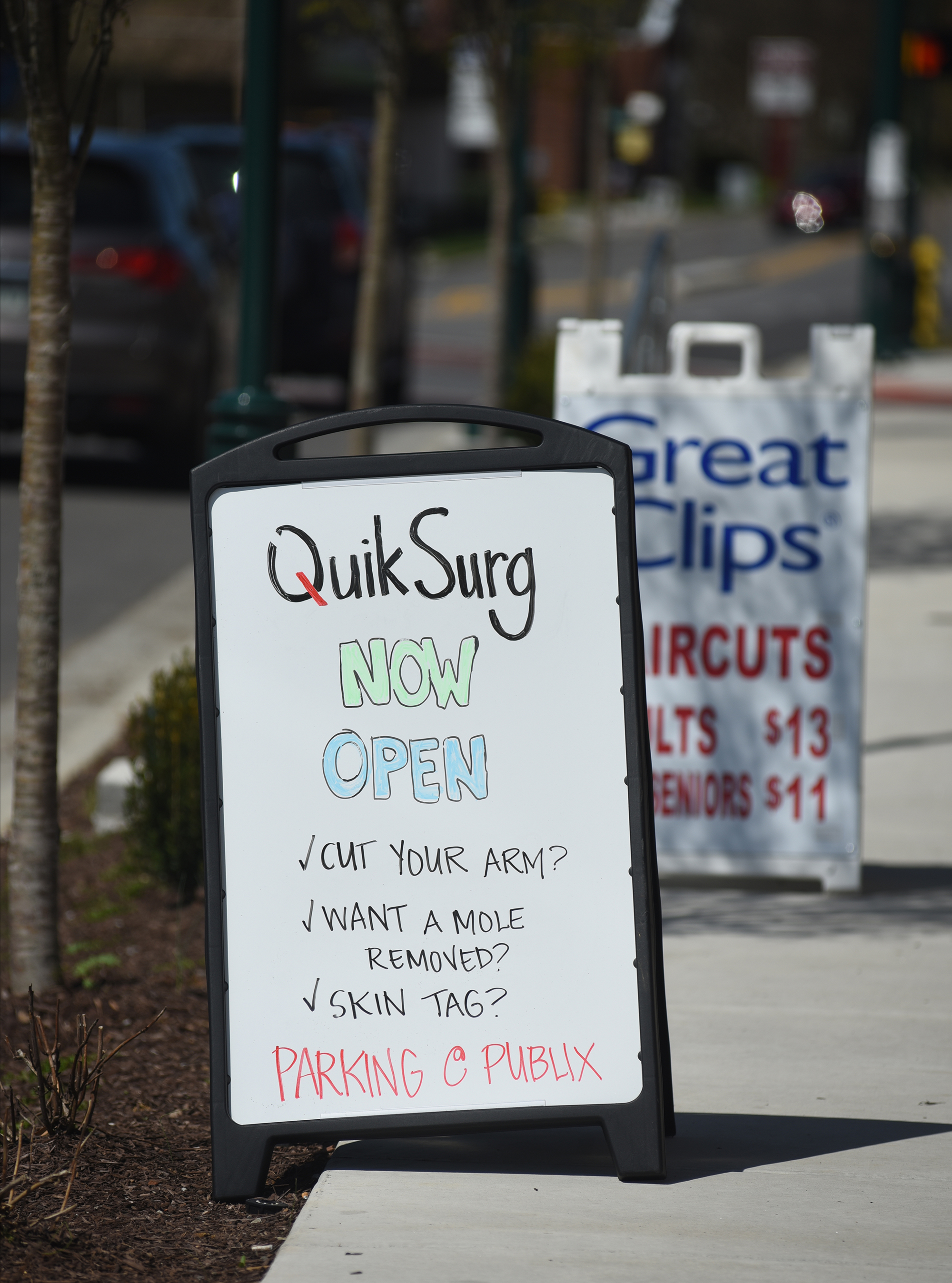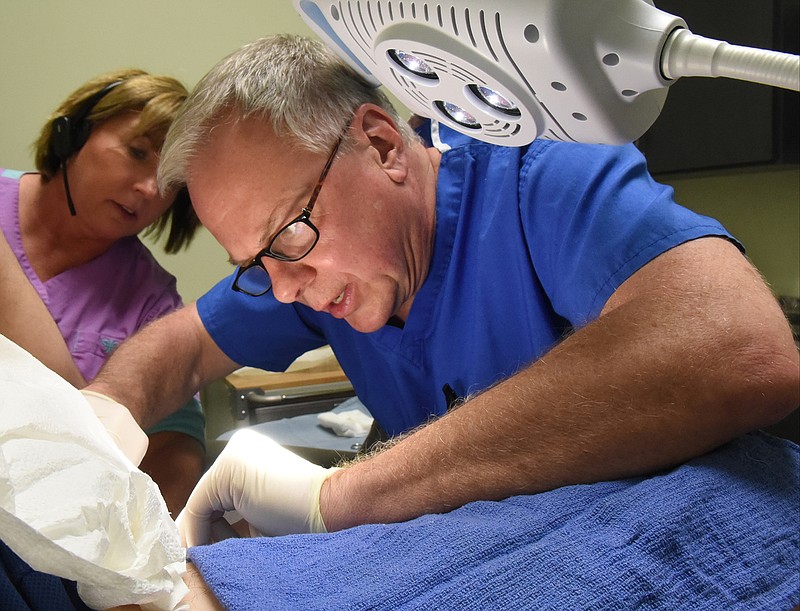Tucked behind the new North Chattanooga Publix, where the Easter hams are now on sale, and a door down from Great Clips, touting its $13 hair cuts, stands a new storefront boasting another kind of deal: Simple, elective surgeries, paid for up front.
"We're Open!" a sign propped outside the door reads. "Mole removal. Stitches. Simple skin lesion removal."
The low-key location of the clinic, QuikSurg, is strategic -- if not symbolic, explains owner Dr. David C. Redd. When he decided to open his new surgical practice, he wanted it somewhere convenient, somewhere without the trappings of a medical park. In more ways than one, he wanted to move outside the traditional borders of medicine.
After practicing for 30 years as a surgeon, Redd was fed up with what medicine had become. Amid an endless tide of billing paperwork, the growing red tape of government requirements, and never-ending wrangling for insurance payments, Redd was feeling less like a doctor and more like a bureaucrat.
QuikSurg is his attempt to get back to the basics. He is opting out of insurance, Medicare and Medicaid altogether, and is instead charging his patients directly. By cutting out the middle man, Redd says, he is able to lower administrative costs and make his prices affordable.
He charges between $50 and $300 for procedures performed solely under local anesthesia: stitches; removing warts, moles, skin tags or toenails; and excising cysts, among other minor surgeries.
In a time of massive upheaval in the health care industry, Redd is part of a small but growing trend of physicians moving toward a "cash-based," direct-pay model in an attempt to simplify and bring more control back to their practices.
"I wanted to bring this business back to the fundamental doctor-patient relationship," Redd said.
Others offering this model of health care range from primary care doctors offering "concierge medicine" -- which usually requires patients to pay pricey monthly fees to have a physician on retainer -- to more affordable fee-for-service models like Redd's, which target the uninsured or those with high-deductible plans.
Sample prices
* Skin tag removal: $50 for simple, $100 for intermediate, $150 for complex * Laceration repair, skin and soft tissue: $150 for simple, $200 for intermediate, $300 for complex * Mole excision: $150 for simple, $200 for intermediate * Wart removal: $100 for simple, $150 for intermediate * Toenail removal: $200 Source: QuikSurg
 Dr. David C. Redd has opened Quick Surg next door to Great Clips near the Publix grocery store on North Market Street. The new business, open for a month, is a cash-based clinic that does not accept insurance or third party payers, making minor surgeries generally more affordable and readily available to the public.
Dr. David C. Redd has opened Quick Surg next door to Great Clips near the Publix grocery store on North Market Street. The new business, open for a month, is a cash-based clinic that does not accept insurance or third party payers, making minor surgeries generally more affordable and readily available to the public. According to the American Academy of Family Physicians, about 4 percent of respondents to a 2012 survey reported taking only cash, up from 3 percent in 2010. A Medscape survey found 6 percent of physicians in the cash-only business in 2013, a small uptick from 4 percent in 2012.
And a 2014 survey by the Physician's Foundation found that some 13 percent of physicians indicated they are planning to transition in whole or part to this type of practice in the future.
Rae Bond, executive director of the Chattanooga-Hamilton County Medical Society, said that while only a handful of local doctors have moved toward direct pay, physician interest has grown in the wake of the Affordable Care Act.
"Even before you can assimilate the newest round of changes in medicine, those changes change," she said. "It becomes a challenging environment to practice medicine. In some ways, doctors long for a simpler time with more direct relationships."
While many physicians are weathering such changes by agreeing to practice mergers and hospital buyouts, a few physicians are attempting to"return to the model of health care 40 and 50 years ago," Bond said.
Physiatrist Dr. Homero Rivas II, a rehabilitation specialist, was one of those who was troubled by stories of colleagues retiring early, warning their kids against a medical career. And he was frustrated with how much influence insurance companies and the government were having on medical decisions. So two years ago, he opened Chattanooga Spine and Body, his direct-pay clinic in Hixson.
"I'm sure many doctors thought I was crazy, but when you look at the numbers, it is more doable than you'd think," he said. "I'm just still trying to educate people about it."
While such a model may be the ideal for many physicians, finding a large enough patient base to support it can be difficult, Bond said. She said primary care doctors and practice "niches" will likely have a better chance for survival than other specialties that require repeat testing and intricate care.
Both Redd and Rivas still have to straddle the old system and their new ventures -- Redd still performs some surgeries at Parkridge Health System, and Rivas works part time at another office. They can't yet afford to lose the stability, they say. But both believe there's a future for full-time, private-pay work.
***
For Redd, the idea for QuikSurg came three years ago when he read an article about a man who wanted a simple skin lesion removal, and wanted to pay for it directly. But after all the required biopsies and specialists, his bill was well over $1,000.
"I'm just reading this and thinking, why on earth would someone have to go through all that, pay so much, for something so simple?" said Redd.
The model that Redd came up with is the first of its kind, he says. Also unusual is Redd's decision to create a "menu of prices" for procedures, for his patients to consult on the front end.
Compared to emergency room prices, which can cost upwards of $1,000, Redd says his prices, which are based on his cost of supplies, are a deal.
"Because insurance determines so much when it comes to pricing, people don't really have a good fix on what anything in health care costs," Redd said.
Rivas charges an hourly rate, taking into account the prices of medications he may use. A single epidural, which can often cost well over $1,000, can cost $250 at his clinic. He keeps overhead low, using only electronic medical records and a small support staff.
Bond said such price transparency can be a breakthrough for consumers struggling to shop around for a procedure. But patients also have to take more responsibility to understand the procedures they're getting and potential liabilities involved. And physicians have to take care to abide by anti-trust rules and price-fixing regulations, she said.
While some critics say the model of private pay cuts out low- to middle-income patients, both Redd and Rivas say they reach patients from a range of backgrounds, and target the uninsured. Such diversity is growing more common in direct-pay practices, writes Dr. Matthew J. Priddy, president of the American Academy of Private Physicians.
"When the world was first introduced to the concept of private medicine, it was under the guise of doctors serving a privileged few patients who were paying large retainers for super-premium medical benefits," Priddy writes. "The direct care movement has grown to spawn a variety of private practice models that fit almost any patient's budget."
Redd says he finds affirmation in patients like one he had a few weeks ago -- a woman who needed nine benign moles removed.
"She told me, 'I don't know where else I could have ever gone to do this where it would have been affordable for me.' She was so happy that she actually had an option," Redd said.
Contact Kate Belz at kbelz@timesfreepress.com or 423-757-6673.
